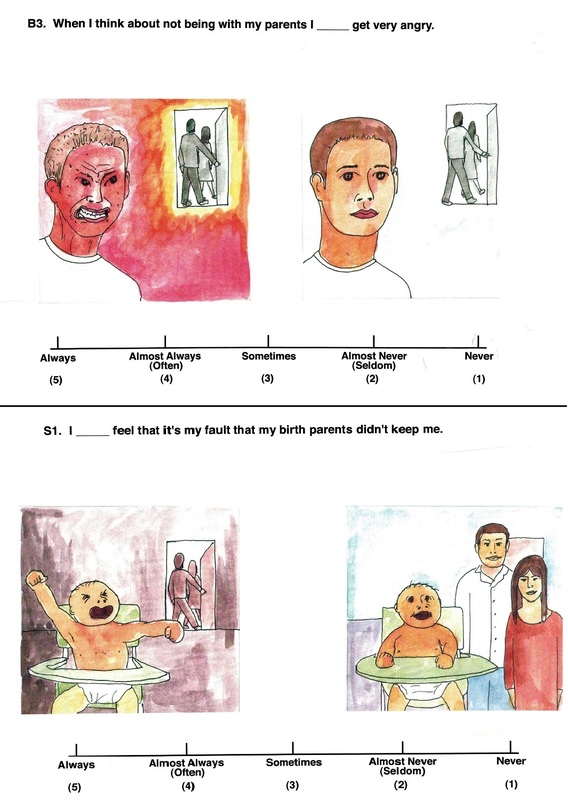Damon is 12 years old. Since his parents, Bob and Carol, were divorced several years ago, he has been living with his mother and brother, John, 15. Until a year ago, Damon regularly spent alternate weekends and some weekday afternoon time with his dad, but he became less interested in visiting, particularly when dad began dating Ruth, a new love interest. John almost immediately began refusing to go for visits, whereas Damon, although somewhat tentatively, continued. He even seemed to like dad’s new female friend, but he asked that she not be present at most visits. Dad acquiesced for a while, but he gradually included Ruth in more and more activities and gatherings. Whereas he initially checked with Damon about his preferences in advance, dad decided to just let his son find out about plans upon arriving for visits. This approach backfired dramatically one day when Damon arrived at dad’s apartment, expecting to enjoy a special father – son excursion to a major car show in town. He was incensed when dad surprised him with the news that Ruth would literally be going for the ride. Damon insisted on cancelling the weekend visit, and demanded to be taken back home, immediately. When dad returned with Damon, he was met by a furious ex-wife, who loudly excoriated him for being so insensitive, and uncaring. She indeed alleged, in full earshot of Damon, that Bob obviously cared about Ruth much more than he cared about his own son.
The above incident occurred a full year ago. For the past year, Damon has refused to have any contact whatsoever with his dad. His anger and displeasure with father have grown substantially during the year, and now seem to be entrenched. Damon has apparently determined that his dad is not a nice person, and that he has nothing positive to offer him. This is in contrast to a rather close father-son relationship that existed earlier in Damon’s life. Damon now declares that he has no desire to ever see his father again. Bob is beside himself. He is convinced that Damon’s feelings and preferences have been hijacked by Carol, whose words and deeds have served to alienate both boys from their father. He has petitioned the Family Court to have Carol cease her alienating behavior, and to ensure that visits be resumed according to court ordered schedule.
Is Damon an alienated child? If so, how did he get to be alienated? Is this something that naturally occurs as children of divorce approach adolescence? Is he merely following in his older brother’s footsteps, and modeling him? Is his alienation totally attributable to mom’s actions? Did dad make things worse? What can be done to remedy the situation?
It is helpful to begin by looking at the child’s presentation, without becoming preoccupied with causality. Most often, there are multiple explanations for why a child behaves as he does, particularly from the perspective of parents who find themselves in adversarial relationships with each other. Ideally, a child enjoys close, secure, favorable relationships with both parents, as well as with other caregivers (e.g. adoptive parents, step-parents, foster parents) who may be involved. As pointed out by Kelly and Johnston (2001), many children, even from healthy, intact families, may have an affinity for one parent, while still desiring contact with both parents. Other children may develop an alignment with one parent over the other, often as a sequela of family conflict. They tend to choose one parent with whom to have more extensive contact, while exhibiting resistance towards the other. Estrangement is seen in children who are exposed to domestic violence, substance abusive parents, child abuse, or excessive negative parenting. Such children have good reason to want to keep their distance from one or both offending parents. On the other hand, the alienated child’s rejection of his parent has little or no basis on actual interactions that he’s had with that parent. Kelly and Johnston define an alienated child as “one who expresses, freely and persistently, unreasonable negative feelings and beliefs toward a parent that are significantly disproportionate to the child’s actual experience with that parent.” Rejection of the parent is intense, total and intended to be permanent.” The child fails to acknowledge the presence of any redeeming qualities about the rejected parent. What makes this so problematic for the child is the very high risk of his eventually failing to find any redeeming qualities about himself as he gets older. A child’s sense of self, slowly develops from infancy as a derivative of the many, many messages of love, competence, and belonging that are internalized through interactions with each parent. In previous blogs, I introduced the construct of psychological permanence as an important mediator in the developing sense of self. In developing psychological permanence, the child gets a better picture of who he is, by first clarifying how he fits in and understands family of origin caregivers. The alienated child’s development of self is disrupted when he regards his rejected parent in such toxic terms to the extent that he doesn’t exist.
Damon’s dad is convinced that his son’s alienation from him is totally attributable to ex-wife, Carol. He surmises that Damon’s disapproval of Ruth’s presence coincides with Carol’s overt criticism of Bob, dating back to when they were still married. He points out how Damon actually uses the same words as he heard mother utter regarding how Bob cared more about his girlfriend than about his son. Is Damon being actively alienated by what mother is saying to him about father, or is the boy being influenced simply by what he has witnessed and overheard in mother’s presence? Carol insists that she has never attempted to undermine the relationship between Damon and his father. She says she feels helpless in her inability to encourage Damon to resume having visits with father. Regardless of the true etiology of Damon’s position, he does indeed present as an alienated child. He is entrenched in his anger towards dad; he wishes to spend absolutely no time with dad; his beliefs and opinions of dad are almost identical to those of mom; there is no ambivalence about dad; there is no circumstance where Damon might be prepared to accept Dad’s apologies; there is no apparent capacity to forgive. Damon’s healthy psychological development, through adolescence into young adulthood, will hinge to a considerable degree on whether he can be liberated from the emotionally stultifying corner he finds himself in. It remains to be seen whether he will cease to be alienated, and instead forge a meaningful relationship with his father.
In the next blog, we will explore how various measures may be used to complement behavioral data in determining when a child is alienated from one or both of his parents. One such measure that developed, the Gries Assessment of Psychological Permanence (the GAPP), is designed to offer a therapeutic pathway for restoring the parent-child relationship. There are also various remedies for this problem that have been applied by Family Court Judges and Referees which will be reviewed.
Leonard T. Gries, Ph.D.
February 28, 2015


 RSS Feed
RSS Feed